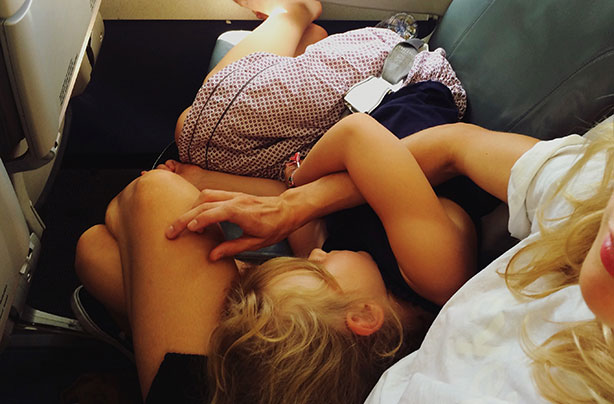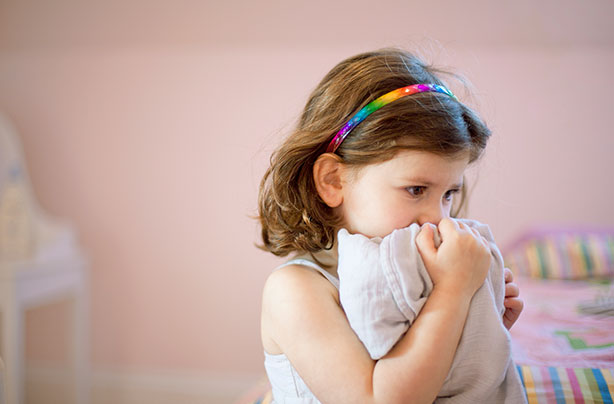Overcoming fear: How can we prevent passing our fears onto our kids?
An expert has their say

Whether it's that spider in the bath that your other half has to remove countless times, or that feeling of anxiety you get boarding a flight, overcoming fear is easier said than done.
In extreme cases, fear can stop us doing things or going places. The UK's top fears as revealed by a 2014 YouGov survey of over 2,000 people comprised of all of the usual suspects - flying, spiders and heights all feature pretty high. But how do we know when a fear is rational, or when it's irrational? And how can we avoid passing on our fears to our children, and raise them without the same limiting phobias that have got in our way of achieving or experiencing things fully?

'It's important to realise fear is an important evolutionary tool. It's our mind's way of trying to keep us safe,' says behavioural expert Christopher Paul Jones, who has a specialist clinic in London's Harley Street.
'Our mind is designed to notice patterns, so once we have created a fear, it generalises our experiences, so in future, whenever we experience a similar event the fear will be triggered.'
We can learn fears from our parents by watching how they react to certain stimulus, but they can also develop from negative experiences from our past or be systematic – reinforced over a number of years. Sometimes it may seem like our fears 'come out of nowhere', but they are always learned behaviours.
So it's important to remember to keep our fearful reactions under control when we're around our children - and Christopher thinks the best way we can do this is to tackle them head on.
'I often have clients asking me to work with their children on their phobia and when I talk with the parent it can become apparent that they have the phobia too. Sometimes I will get answers from the parents saying things like, "well I don't tell my child about my phobia",' he explains.
Parenting advice, hot topics, best buys and family finance tips delivered straight to your inbox.
'Unfortunately, children, especially at a young age, pick up a lot of our nonverbal behaviour. It's called the modelling or imprinting age. In the same way parents are taught that children will do what you do and not what you say, that is also true for your fears and phobias.'
Rational and irrational fears
Just because we think a phobia is silly – we know the spider is more scared of us – doesn't mean it's invalid, and it can be just as harmful to our kids and ourselves as what we might think of as a 'rational' fear.
'The difference between irrational and rational fears are really to do with how much danger you're actually in – so, what's the statistical likelihood of your fear coming true? When it comes to something like flying you could call this an irrational phobia,' explains Christopher.
'Even though some people might argue that, because crashes do happen it's rational, the truth is it's so rare that you would need to be much more afraid of being hit by a meteor or being injured falling out of bed or dying in the bath, as all these are [statistically] much more likely.'
But identifying when a fear is reasonable isn't always easy when we're in the midst of it, and Christopher stresses that we should tackle whatever we're afraid of with the same degree of dedication.
'It is never of benefit when we try to ignore or suppress our emotions,' he says. 'Our fear will find other way to come out, i.e. bouts of anxiety, bad dreams, extreme overreactions etc. Sometimes when my clients have had a lot of fear in their past they try to avoid their feelings and then they wonder why their anxiety is getting worse.'
Fear and phobias
Like rational or irrational fears, we tend to give more gravity to what we think of as phobias because we harbour the mistaken belief that they are more 'serious' than fears.
'A phobia is automatic, for instance, we see or experience the thing we are phobic of and our mind and body will have an instant response,' says Christopher. 'Fears are normally less powerful and are often a feeling of apprehension or unease. If you are phobic of flying for example and it is severe, you could see an aeroplane in the sky and be instantly struck by anxiety, while somebody with just a fear might just be a bit nervous and need a stiff drink to get on the plane.'
Although admittedly different experiences, it's important to be mindful of transmitting fears or phobias onto our kids, who are particularly susceptible to our behaviours.
'Fears and phobias can be created at any age if the fear stimulus is strong enough. 'If you had a really bumpy flight as an adult it can be enough to create a fear or phobia,' says Christopher. 'However, a lot of fears do start in childhood for the simple reason we haven't developed the same ability of taking events in perspective to rationalise them.'
So how can I stop passing my fears onto my child?
So, how can we convincingly tackle our child's phobia if it's the same as our own? How can we encourage them to think logically about something they're afraid of, if we can't even do it ourselves? Overcoming fear is tough, but luckily, says Christopher, 'the techniques that work on adults will normally work the same way for children too.
If you notice your child becoming scared or fearful, it's a good idea to ask them some questions – what is it they're scared of? What do they think might happen? And then get them to challenge their own thought process by asking to think how likely it is that it really will.'

'Another method is to let them have fun with the images they are making in their mind when they are afraid. Ask them to play with those images, make it a cartoon or get them to imagine everyone in the image with Mickey Mouse ears, or imagine the fearful event at high speed and everyone in it has a chipmunk voice. This should quickly reduce the fear that they are feeling.'
'Once you have done this with your child, you might find it easier to apply these methods to your own fear.'
Ultimately, it's important not to suffer in silence and always seek the help of a professional if you fear yours or your child's fear is getting out of control.
'Of course my best advice to help your child not develop fears and phobias is to consult a professional with knowledge in these areas,' he adds. 'They will be able to help you tailor an approach that's right for your child.'
Trusted, informative, and empathetic – GoodToKnow is the ultimate online destination for parents. At GoodtoKnow, our mission is 'simple': we're trying to make sense of parenthood. On the site, you'll find everything you need for a happy, healthy family life. Our huge archive of content includes more than 18,000 articles and 1,500 how-to videos. These include expert-backed advice features on parenting, dealing with relationship changes after having a baby, self-care for mums and managing your family finances. We also feature tried-and-tested product reviews and buying recommendations for every stage of family life - from prams and Moses baskets to birthday gifts and top toys.